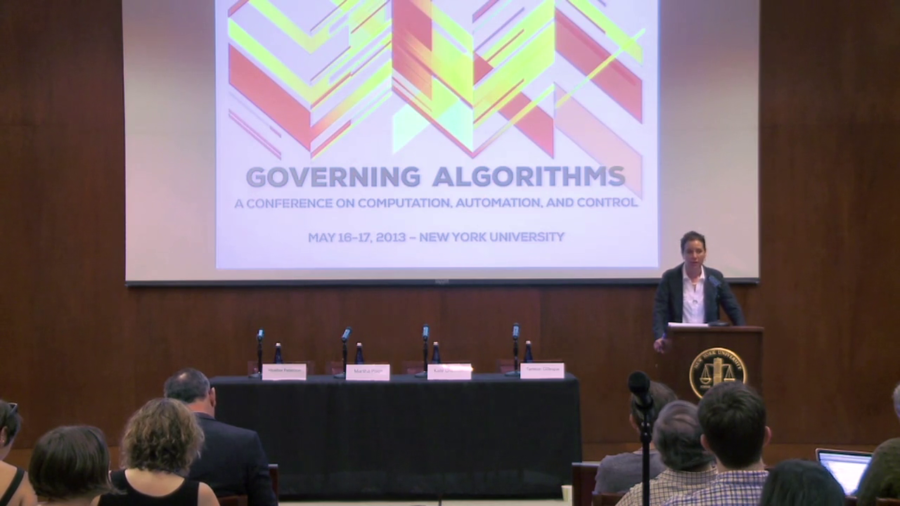Helen Nissenbaum: Good morning. Welcome everybody. I’m Helen Nissenbaum, and I’m delighted to welcome back those who were here last night, and welcome those who have just joined us today. As you know this is the second day of our conference on governing algorithms and we’ve already been treated to two outstanding presentations by Bob Tarjan and Claudia Perlich, with insights into what…well, a little bit into what algorithms do. And today we continue to explore the social, philosophical, ethical, legal significance of algorithms.
I have a few introductory remarks that will be similar to some of what I said last night, but I do want to thank and express appreciation and recognition first of all for the institutional sponsors of this event, Media, Culture, and Communication, a department at NYU in which I’m a professor. I’m not sure if I mentioned, I’m Helen Nissenbaum, a professor of media, culture, and communication, and director of the Information Law Institute.
The second of our sponsors is the Intel Science and Technology Center for Social Computing. And I welcome several of my colleagues from that center to this event today.
And the third is the Information Law Institute at New York University’s law school, which is a research center devoted to law and policy as they relate to information technology, information, and digital media, not only to deepen understanding but to make a positive impact.
Now, for those of you who’ve just joined us I want to mention several people, individuals, who’ve contributed in crucial ways to just this event existing and also to the spectacular lineup and material that has been developed for it.
Katherine Strandberg, who helped steer the Information Law Institute. And by the way you’ll get to know some of the these people throughout the day. I should Nicole Arzt and Dove Pedlosky who are not—I don’t think they’re in the room with us today. Nicole is the administrator of the Information Law institute. And Dove Pedlosky is the Associate Director for External Relations in the department of Media, Culture, and Communication. And they worked really really hard toward this event.
Solon Barocas, a PhD student in media, culture, and communication, and a fellow of Information Law Institute, who helped with the conception of this event, with steering its intellectual direction, for identifying many of the really great speakers that we have for you today.
And of course this event is has predominantly being organized and developed by Malte Zeiwitz, who will give some substantive introductory remarks after me, and Sophie Hood, who we’ve been enormously lucky to have as postdoctoral research fellows of the Information Law Institute and Media, Culture, and Communication. Among the various things that the Informational Law Institute does, we sponsor a privacy research group. And I see some familiar faces from that. We meet on a weekly basis and in addition to that we are fortunate to be able to sponsor some legal research fellows and postdoctoral fellows, and we always have several visiting faculty fellows and student fellows from all over the world and the United States.
Now, it’s not really possible in the few minutes I have to say how much Malte and Sophie have given of themselves for this event. In addition to planning this event and all the details of it, they’ve also created a material backend which some of you may have seen which will serve as a resource even as this conference ends. And we hope that the resource will grow so that those of us who are interested in the field will have something to go to and presumably to contribute to. And what I also want to recognize is that many of you in the room are experts in your own rights, and you’ve contributed to this resource and you join us from far and wide. And we’re very grateful for that. So welcome and over to Malte Zeiwitz.
